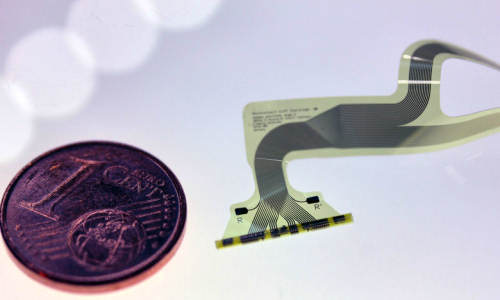Researchers develop new method for lowering high blood pressure without side effects.
The cuff is equipped with electrodes that can lower blood pressure without causing side effects. Photo Source: IMTEK
High blood pressure is the greatest health risk worldwide behind smoking and alcohol consumption. In Germany, around 25 percent of the population suffers from arterial hypertension, as the condition is referred to in medical circles. The microsystems engineers Dr. Dennis Plachta and Prof. Dr. Thomas Stieglitz from the Laboratory of Biomedical Microtechnology at the Department of Microsystems Engineering (IMTEK) of the University of Freiburg teamed up with the neurosurgeons Dr. Mortimer Gierthmühlen and Prof. Dr. Josef Zentner from the Medical Center – University of Freiburg to develop a new cuff equipped with electrodes that can lower blood pressure without causing side effects.
Doctors usually prescribe drugs against high blood pressure. In around 35 percent of patients, however, pills do not succeed in reducing blood pressure in the long term. Chronic high blood pressure leads to damage in other organs – the eyes, kidneys, the heart, and the central nervous system, in particular. In order to help patients whose blood pressure cannot be reduced by means of drugs, the Freiburg researchers propose implanting a newly developed cuff with 24 electrodes in the so-called vagal nerve on the neck. The device starts by determining which electrode is closest to the nerve fibers that transmit the blood pressure signal. Then it uses electrostimulation to overwrite the information in these fibers with such precision that other bundles of fibers with other functions are not affected. The researchers have named this procedure for individual analysis, selection, and stimulation “BaroLoopTM.”
The scientists tested the device on rats and succeeded in lowering their mean blood pressure by 30 percent, without causing side effects such as a reduced heart rate or a drastic decrease in respiratory rate. The findings of the study have been published in the Journal of Neural Engineering.
The idea for the research project originated in 2004 within the context of the establishment of the Peter Osypka Endowed Chair in Neuroelectronic Systems at the Department of Neurosurgery. Now that the scientists have determined that a cuff with electrodes is feasible in principle, they have begun to develop a completely implantable system. As such a device is classed as an active implant that must fulfill the highest level of safety standards according to medical product laws, they do not expect to produce a licensed product for at least ten years.
Story Source:
The above story is based on materials provided by Albert-Ludwigs-Universität Freiburg.





